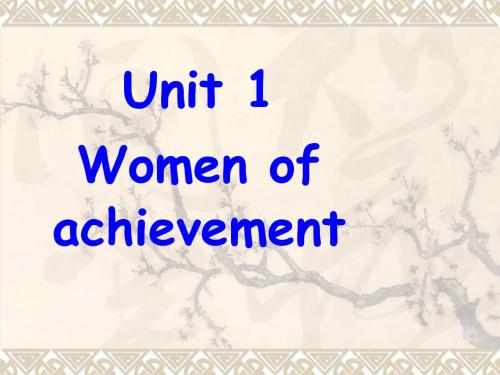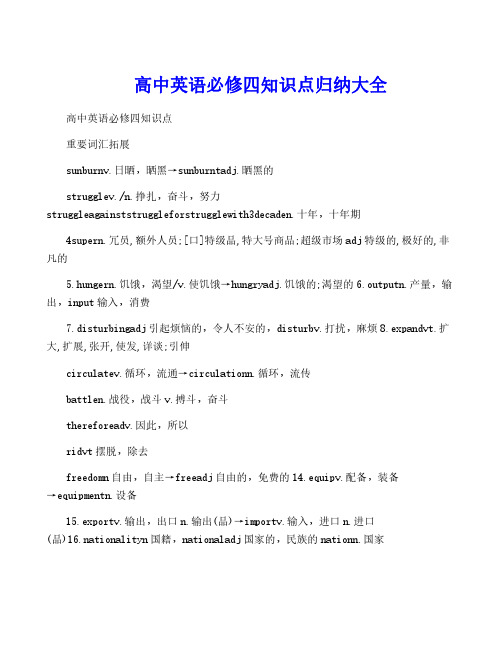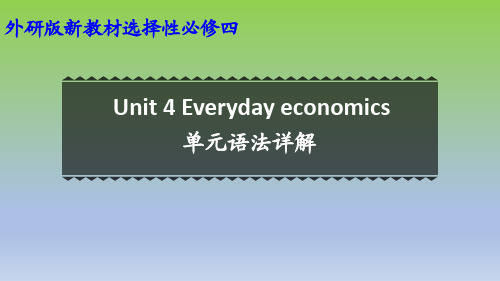英语必修4语法
高中英语必修四Unit_1_Women_of_achievement主谓一致语法

5.none 和 neither 作主语时,谓语可用单 数也可用复数,但如果修饰的是不可数名 词只用单数 None of us is/are perfect.(人无完人) None of the information has been received.
6.从句、不定式(短语),动名词(短
语),从句作主语时,谓语用单数 e.g. To read English aloud every morning does ____ (do) you a lot of good. is (be) my great happiness. Serving the people ____ When and where we will have a picnic has not been _ (be not) decided yet. _______
意义一致 8
集合名(family,class,team,group,crowd
public,government,band, company, army,police,enemy,crowd,audiece,pop ulation...) 若强调整体,谓语动词用单数 若强调个体,谓语动词则用复数 e.g. The group is (be) made up of nine students. The group are (be ) dancing happily.
physics, politics, mathematics等一些以 “-ics”结尾的词,指学科时属单数,谓 语动词用单数。 Physics is not difficult to learn. Mathematics is a subject studied in nearly every school. 注:若指某学科能力,成绩,应用等或非 学科含义时被看作复数,谓语常用复数。 My mathematics are week. What are your politics? 政治信仰/见解
高中英语必修四知识点归纳大全

高中英语必修四知识点归纳大全高中英语必修四知识点重要词汇拓展sunburnv.日晒,晒黑→sunburntadj.晒黑的strugglev./n.挣扎,奋斗,努力struggleagainststruggleforstrugglewith3decaden.十年,十年期4supern.冗员,额外人员;[口]特级品,特大号商品;超级市场adj特级的,极好的,非凡的5.hungern.饥饿,渴望/v.使饥饿→hungryadj.饥饿的;渴望的6.outputn.产量,输出,input输入,消费7.disturbingadj引起烦恼的,令人不安的,disturbv.打扰,麻烦8.expandvt.扩大,扩展,张开,使发,详谈;引伸circulatev.循环,流通→circulationn.循环,流传battlen.战役,战斗v.搏斗,奋斗thereforeadv.因此,所以ridvt摆脱,除去freedomn自由,自主→freeadj自由的,免费的14.equipv.配备,装备→equipmentn.设备15.exportv.输出,出口n.输出(品)→importv.输入,进口n.进口(品)16.nationalityn国籍,nationaladj国家的,民族的nationn.国家17.occupationn工作,职业,占领occupyv.占用,使从事,把注意力集中于...占领,占据18.confusev.使迷惑,使为难→confusedadj.感到迷惑的confusingadj.令人迷惑的19regretv./n.后悔,遗憾→regretfuladj.后悔的,遗憾的20.productionn.生产,制造,productive可生产的,可制造的,produce–v生产,制造21.discoveryn.发现,发觉,discover-v发现,focusv.集中,聚焦,n焦点,中心点reducev.减少,缩减→reductionn.减少,缩减返回目录高中英语知识点梳理重点梳理1ifnot如果不….Ifso如果这样,2.consideroneselfsth自认为是…considersbsth认为某人是…3.sincethen从那时起4.searchforawaytodosth寻找做某事的途径。
高中英语人教必修四unit4单词,短语,重点句型梳理

Unit 4重点单词、短语、句型梳理重点单词●●greet【课文原句】There are many different ways to greet someone using words. (Page 25)【点拨】greet v. 意为"迎接;问候"。
如:He made his way through the crowd to greet us.Bill opened the door to Harold and greeted him with cries of welcome.【拓展】greeting n. 意为"问候;祝贺",是可数名词。
如:"How are you?" is a conventional greeting."Good morning, "I said, but he didn’t return the greeting.【小试牛刀】句型转换。
1. The two students exchanged greetings.= The two students ________ _______ _______.2. We sent him a message, greeting his birthday.= We _______ _______ to his birthday.Key: 1. greeted each other2. sent greetings●●function【课文原句】... the smile —its function is to show happiness and put people at ease. (Page 30)【点拨】function n. 意为"作用,功能"。
如:The machine performs a very important function in our work.【拓展】function v. 意为"起……的作用(常与as连用);运转"。
必修4doing语法

can't help to do 不能帮助做某事
2012年12月27日星期四
9
____________ ___________ to do doing
manage expect decide seem offer
both to do and doing
hate love prefer remember regret
2012年12月27日星期四
12
3. doing 作定语。
①用途 There is a swimming pool = A pool is used for swimming ② 动作,正在进行 A sleeping child=the child is sleeping
2012年12月27日星期四
promise imagine suggest fail avoid hope afford admit practise plan
enjoy finish mind miss keep
try stop begin forget like start
promise , enjoy , fail , try , finish , hope , stop , begin , afford , forget , like , mind , miss , start , plan , keep
V + -ing 形式用法归纳
以doing为例
Revision
1. doing做主语
doing做主语往往表示经常性、习惯性、 泛指ቤተ መጻሕፍቲ ባይዱ抽象性的动作, 在口语中也可以表示 具体的动作。如:
Talking to him is talking to a wall. Talking mends no holes. Eating vegetables is beneficial to our health. Walking is a good form of exercise for both young and old.
高中英语 语法复习十动词的语气——虚拟语气 新人教版必修4

主句
与现在事实相反
动词的过去式(be的过去式一般用were)
would/ should/ could/ might +动词原形
与过去事实相反
had +过去分词
would/ should/ could/ might + have +过去分词
与将来事实相反
动词过去式,should +动词原形,were to +动词原形
A. Had I known, would ring him upB. Should I know, would have rung him up
C. If I knew; would ring him upD. Had I known; would have rung him up
4. Mary is ill today. If she _____ , she ____ absent from school.
4、虚拟语气在定语从句中的用法:在"It is time (that)…"句型中,定语从句的谓语动词常用虚拟语气表示将来,动词形式一般用过去式,意思是"该干某事的时候了"。如: It’s (high) time we did our homework.我们该做作业了。
5、虚拟语气在简单句中的用法
(1)情态动词的过去式用于现在时态时,表示说话人的谦虚、客气、有礼貌,或委婉的语气,常见于日常会话中。如: It would be better for you not to stay up too late.你最好别太晚睡觉。
6、省去条件从句或主句:表示虚拟语气的主句或从句有时可以省略,但其含义仍可以推知。
(1)省去条件从句。如: You could have washed your clothes yourself.你本可以自已洗衣服的。省去了"If you had wanted to")(事实是:你自己没洗衣服,因为你不想洗。)
2019外研版高中英语选择性必修四Unit4 单元语法详解课件

● 温馨提示:主句是疑问句时,首先要确定定语从先行词, 方法是将疑问句恢复成肯定句,然后进行辨别确认, 请观察 以下句子
a. Is this the factory __(_t_h_a_t_/w__h_ic_h_)__ we visited last week?
※肯定句:This is the factory(_th_a_t_/_w__h_ic_h)we visited last week.
1. I will never forget the day __w_h_e__n_ I first went to school. 2. I will never forget the day _w__h_i_c_h_/_t_h_a_t_ we spent in Beijing. 3. The house w__h_i_c_h_/_t_h_a_t_ we visited is being repaired now.
※先行词既有人又有物时,请观察以下句子
They talked about the persons and things (that) they knew in the school.
● 关系代词 that前不加介词; 非限定性定语从句不用 that 引导,请观察以下句子
a. This is the house in which Luxun once lived (in that)
d. He who has not been to the Great Wall is not a true man.
●不管先行词是人还是物,用 that 的两种情况 ※ 由 which 和 who 开头的特殊问句中避免重复, 请观察以 下句子
a. Which is the subject ( that ) you are going to learn next term? b. Who is the man that came to see you just now?
【高一同步教程】高中英语必修4 Unit5语法:构词法讲解及练习
高中英语必修4 Unit 5语法教学案Section ⅢGrammar—构词法语法图解【探究发现】①chairman主席newspaper报纸hometown 家乡airport 机场sunrise 日出②dislike 不喜欢incorrect 不正确的unlucky 不走运的retell 复述telephone 电话③reader 读者inventor 发明家Chinese 中国人Indian 印度人artist 艺术家kindness 和蔼operation 手术④water 水/浇水dry 干的/弄干book 书籍/预订nurse 护士/护理better 更好/改善[我的发现](1) ①组中的单词是将两个单词合并在一起,形成一个新的单词。
这种构词法被称之为合成法。
(2) ②组中的单词都是在各自的词根前加了不同的前缀,如dis-,in-,un-,re-,tele-等。
(3) ③组中的单词是在各自的词根后加了不同的后缀,如-er, -or, -ese, -ian等。
(4) ②③组中单词的构词法被称之为派生法。
(5) ④组中的单词所展示的构词法被称之为转化法。
英语中词的构成方法主要有三种:合成、派生和转化。
一、合成由两个或更多的词合成一个词,有的用连字符“-”连接,有的直接写在一起,还有的由分开的两个词构成。
1.合成名词构成方式举例构成方式举例名词+名词weekend周末动词+名词postcard明信片名词+动词daybreak破晓动词-ing+名词waiting-room候车室名词+动词-ing handwriting书法形容词+名词fastfood 快餐构成方式举例构成方式举例名词+动词-ing English-speaking讲英语的形容词+名词part-time兼职的名词+动词-ed state-owned国有的形容词+动词-ing good-looking相貌好的副词+动词-ed widespread分布广的形容词+名词+-ed warm-hearted热心的构成方式举例构成方式举例形容词+名词sometimes有时副词+名词indoors在室内介词+名词alongside在一边副词+介词nearby附近4.构成方式举例代词宾格+self herself她自己himself他自己物主代词+self myself我自己yourself你自己形容词+名词anything任何东西somebody某个人5.合成动词构成方式举例名词+动词sunbathe晒太阳typewrite打字形容词+动词whitewash粉刷safeguard保卫副词+动词overthrow推翻upset使生气[名师点津](1) 合成词的复数形式通常是把前面的主体名词变复数。
外研社英语必修四第一单元语法讲解及练习(精)
将来进行时的讲解及练习1. 一般将来时是指将来某个时间将要发生的动作和状态,基本结构是:主语+will/be going to do如:I wil/am goning to Beijing next sunday.我下个星期天将要去北京。
2. 将来进行时是指将来某个时间正在进行的动作。
基本结构是:主语 +willbe/be going to be +doing如:I will be sleeping at 12:00p.m. 十二点的时候我将在睡觉。
I will be studying in university at the age of 20.我 20岁的时候我将会在大学里学习。
一、将来进行时用来表示在将来的某一个时间正在进行的动作①下个星期的这时候 , 我们将在那个工厂劳动 .This time next week we shall be working in that factory.②明天下午三点 , 我们将正在开会 .We'll be having a meeting at three o'clock tomorrow afternoon.③你将什么时候见怀特先生 (语气较委婉客气 , 下属对上司 When will you be seeing Mr. White④今天晚上七点 , 学生们将正在看电视 .The students will be watching TV at seven this evening.二、将来进行时主要表示将来某一时刻正在进行的动作 , 或表示要在将来某一时刻开始 , 并继续下去的动作。
常用来表示礼貌的询问 , 请求等。
例如 :1This time next day they will be sitting in the cinema.用法 :强调在将来的某个具体时间正在发生的动作或事情 .例 :Don't worry, you won't miss her. She will be wearing a red T-shirt and a white skirt at that time.别担心 , 你不会认不出她的 . 她到时会穿一件红色的 T 恤衫和一条白色的短裙 .例 :This time tomorrow you ________ there doing some more exercises.A will sitB will be sittingC sitD shall sit答案是 B. 因为 this time tomorrow是个很具体的将来时间 .三、将来进行时用来表示不含意图又未发生的动作注意 :将来进行时不用于表示 " 意志 ", 不能说 I'll be having a talk with her.I will be helping Mary tomorrow.明天我帮玛丽干活 .这不表示说话人已安排好要帮助玛丽或者想帮助她 . 这个句子仅仅说明这一动作将要发生 . 将来进行时的这When shall we be meeting again?五、与现在进行时态的区别现在进行时表示一种经过考虑的 , 将来要进行的动作 , 而将来进行时通常表示正常过程中会发生的动作 , 因此将来进行时不如现在进行时那样肯定 , 比后者偶然性要大一些 :I am seeing Tom tomorrow. 明天我要和汤姆见面 .I'll be seeing Tom tomorrow. 明天我会见到汤姆 .第一句意指汤姆或说话人已经特意安排了这次会面 , 而第二句则意指汤姆和说话人将在通常进程中见面 (也许他们在一起工作 . 不过这种差别并不是在任何情况下都很重要 , 而且常常两者都可以使用 . 现在进行时用于表示最近将来的动作时 , 必须有确定的时间 , 而将来进行时可以和确定的时间状语连用 , 也可以不连用 . 它既可以表示最近将来的动作 , 也可以表示较远将来的动作 . 可以说 :1I am meeting him tomorrow. 我明天和他会面 .I'll be meeting him tomorrow/next year/some time/. 我明天 /明年 /某时将与他会面 .六、与一般将来时态的区别将来进行时通常表示的是对将来事实的简单陈述 .而 will+V. (一般将来时除表示时间概念外 , 还带有感情色彩 .e.g. 汤姆明天将正在割草 . Tom will be cutting grass tomorrow.汤姆明天愿意割草 . Tom will cut the grass tomorrow.将来进行时专项练习一、单项填空1. The Blacks with us for the time being.A. will stayB. would stayC. have been stayingD. will be staying2. The plane at the present speed until it crosses the mountain at about ten tonight.A. would goB. wentC. will be goingD. goes3. Mr. Smith will not be able to attend the meeting tonight because ______ then.A. he must have a classB. he will be teaching a classC. he teaches a classD. he will have been teaching a class4. I won’t be able to watch the concert on TV tonight because I homework at that time.A. shall have doneB. shall be doingC. shall doD. have been doing5. I _______ my boss at three this afternoon.A. shall be picking upB. shall be pickedC. shall have been picking upD. shall have picked 6. You can’t miss Frank. He______ a dark green suit and a yellow tie waiting for you.A. is wearingB. will wearC. wearsD. will be wearing7. ----Could you give these books to Mr. Black?----Absolutely, _______him at five o’clock this afternoon.A.I will have a talkB. I have a talk withC.I can have a talk withD.I will be having a talk with 8. I’m afraid I won’t be available then. I _____ a friend off at three this afternoon.A. seeB. am seeingC. will seeD. will be seeing9. Next Friday I will go to another concert .They ____some thing by Mozart at that time.A. playB. will be playingC. are going to playD. are to play.10. ---What are you doing, Jack?---Make a model plane. I ____ it in the science class at 10 o’clock tomorrow morning.A. will be showingB. am going to showC. showD. have showed11. We _____ a debate on some environmental issues all afternoon tomorrow.A. will be havingB. am havingC. am going to haveD. have12. What do you think you _____at this time next year?A .will do B. will be doing C. are about to do D. do13. ---What will you do tomorrow evening?---I _____my favorite program between 8 and 11, then I will go out to drink in my usual bar.A. will watchB. am about to watchC. will be watchingD. am watching14. ---When will you come to see me, Dad?---I will go to see you when you_____ the training course.A. will have finishedB. will be finishingC. are finishingD. finish215. Tom sat under a tree and seeing his friend, up in no time.A. to standB. standingC. stoodD. would stand16. I _______ very happy if I could be of some service to you.A. would beB. have beenC. must beD. can be17. The meeting was to at 9 o’clock but the manager until twenty minutes later.A. start; didn’t turn upB. have started; didn’t turn upC. start; hadn’t turned upD. be started; hadn’t turned up18. ---- he come to see you?----Of co urse, please. And I’d rather heA . Will; informB . Shall; toldC . Should; would sayD . Can; spoke19. If the building project _____ by the end of this month is delayed, the construction company _____ fined. A. will be completed; is to be B. to be completed; will beC. being completed; will beD. completed; was20. ---- I rang you at about ten, but no one answered the phone.---- Oh, that was probably when I _______ my neighbor.A. visitedB. was going to visitC. was visitingD. had visited21. Because I the next day, I went to bed early on Saturday evening.A. was leavingB. will leaveC. had leftD. was about to leave22. ----Henry, fancy meeting you here.----Oh, it’s you Jack. Sorry, I ______ you ______ to me.A. didn’t think; were speakingB. don’t think; spokeC. didn’t think; would speakD. thought; are speaking23. By next summer John in this factory for thirteen years.A . has been workingB . will have been workingC . will be workingD . has worked24. He will have learned English for eight years by the time he __________ from the university next year. A. will graduate B. will have graduated C. graduates D. is to graduate25. I _______________ the office when the telephone rang.A. was about to leaveB. would leaveC. leftD. was to leave26. According to their agreement reached in 1943, no country ___________ peace with Germany alone. A. is to make B. was to make C. would make D. was about to make27. He promised me if we_______ the game, he ________us a round of drink.A. win; will buyB. would win; would buyC. won; boughtD. won; would buy28. He said time and time again that he _________, but he actually stayed well after midnight.A. is leavingB. was leavingC. was to leaveD. will leave29. ----Mom, I got the first prize in the spelling contest.----Oh, how great! Daddy will be so proud of you. He _____ you _____ to win.A. never think; are goingB. never thought; were goingC. didn’t think; were goingD. hadn’t thought; were going30. Tom_________ to Jerry and tell him about his new school at once.A. will writeB. writesC. wroteD. writes3二、用所给动词的适当形式填空1. He __________ (lie on one of the sunny beaches in Hawaii all day when he spends his holiday there.2. Don’t call me between 2:00 and 4:00 this afternoon. I ________ (have an test then.3. Nobody knew what ________ (happen to the Earth in a century’s time.4. Mr. Lee said he would give the CD to me as soon as he ______ (return from Canada.5. When we were young, father________ (take us for a special treat on Mother’s day.6. ----Did you invite Sarah to your birthday party?----Sorry, I forget. I _______ (call her now.7. You have to put in more effort if you were _________ (pass the test.8. I __________ (tell you about my plan, but you stopped me before I could speak.9. Will you __________(use your computer this time tomorrow?10. I __________ (close the kitchen door when a little mouse popped its head out.三、中译英1. 我正打算往河里跳时看见水里出现一条蛇。
外研版高一英语必修四unit4语法课教案设计
Lesson plan for Great ScientistsTeachi ng Procedurese.The new hybrid rice has been developed by the Yuan Longping High-tech Agriculture Company of China.T:Now answer the following questions.1 .Which sentence is in the present simple(passive voice)?2 .Which sentences are in the past simple(passive voice)?3 .Which sentence refers to the future?4 .Which sentence is in the present perfect?3. Present the passive voice with four tenses on PPT the present simple, the past simple, the futuresimple, and the present perfect; then explain the usage of the sentences from the PPT one by one.4. Conclude the forms of the passive voice and show it on PPT. Let Ss learn to observe the sentences structures and distinguish the different tenses.The teacher guides the students to make a simple summary of the voice they have learned and form a clear concept of it.Stage 3 Practice (10mins)1. Ask Ss to do the exercise 1 and exercise 2 of different tenses about the passive voice. 厂 一Exercise 1 J 1.1 vxltfl monry ______ . Ihe lliedltv illA. was fnundB. find 吊 1 round Ik fonrid«rv cnnriiJ<nt ihiHenvironment _______ hy our furthervl'Jbrh tu induct pullulion.A. had been improved ' hr iniproi «dC?. k impiwcd 1). WHS improvrdXU nalliing _______ , Uiv(K?c3ns «111 turn inlo I LS J I deserts,A. doe\ B* h 刘d been done will 号 JuneExercise 2Fill in the blanks.Part oneLihui: Let's learn other scientists.Lihua: Cailun is a great inventor I'd like to talk.Lihui: Great,we all know that Papermaking _____________________ (invent) by him.Lihua:Yes,with the development of society, different types of paper _____________________ (develope) sofar.Lihui:Maybe in the future, new paper ________________ (create) and ________ (use) in other area.Part 2Tom:Do you know some famous scientists?Tina:Yes,Stephen Hawking,he _________________ (know) at home and abroad widely.Tom:for example?Tina:He ___________ (graduate) from Oxford University.In the 1960s,He (diagnose)with motor neurone disease.but he never gave up, his book A Briefbe +doneDesigning purposeHistory of Time(publish)in 1988.He is so outstanding and we(influence) by him.Tom:Right.we all believe his work(use) in other new field that(explore) by others scientists recently.Stage4 Production Discussion and making sentences in groups.(11 mins ) 1.Teacher show some pictures in the PPT, then ask Ss to discuss and describe the picture byusing the correct form of passive voice in groups. And some prompts are given besides the picture.T: I think you have learned passive voice by hearts. Now, we will make some sentences in passive voice inpassive voice.You know,we should learn not only their forms but also how to use them correctly. Ask Ss todiscuss the exercise in groups and finish it.Practice 1: Make sentences according to the pictures and given words.2.Write a short dialogue within sive sentences to describe the scientists with the right types of PV.Scientists are as follows:MadameCurie,Edison ect.3.Give some comments on the Ss' performance and then give a brief conclusion.Blackboard/PPT Design(板书 /媒体设计)Module 4 The Passive VoiceBe+done1.the present simple: am/is/are+done2.the past simple: was/were+done3.the future simple: will be+done4.the present perfect: have/has+been+done。
人教版高中英语必修 4 unit 4语法精讲精练--- 分词作定语和状语
必修 4 unit 4语法精讲-----分词作定语和状语一、作定语。
单个的分词作定语时放在所修饰词的前面,但是如果修饰some/any/no/every+thing/body/one 或者指示代词those时,分词应在其后。
分词短语作定语时应放在所修饰词的后面。
在用作定语时,分词在意思上接近一个定语从句。
The boring snow made the bored boys go home. (= The snow was boring, so the boys wee bored and went home.)注:现在分词与过去分词都可作定语,但现在分词表达的是正在进行的事情,有主动意义;而过去分词表示的是已完成的事情,有被动意义。
例如:I have no teeth left.Anyone swimming will be punished.The question being discussed in the meeting is very important.There are a lot of fallen leaves on the ground.二、作状语。
分词在句中作状语时表示动作发生的时间、原因、条件、结果或让步等,多置于句首,做伴随状语,多放在后面。
分词用于go doing结构中作目的状语。
分词短语作状语时,其逻辑主语必须与句子的主语一致。
如果与句子主语不一致,那么分词短语就需要有自己的逻辑主语,且要用独立主格结构形式来表达。
①时间状语:分词作时间状语相当于时间状语从句。
现在分词作时间状语一般位于句首,表示的动作和谓语动词的动作同时发生,有时现在分词前可以加上时间连词。
如果分词动作发生在谓语动词之前,用现在分词的完成体形式。
过去分词作时间状语与谓语动词构成同时性和被动意义。
分词前有时加上时间连词。
Arriving (=When he arrived) at the bus stop, he found his sister there.Waiting (=When I was waiting) to see the doctor, I met with a friend of mine.Having (=When we have) made full preparations, we are ready for an examination.Having (=When he had) finished his homework, he went to bed.After finishing his homework, he went to bed.Seen (=When the town is seen) from the hill, the town looks more beautiful.Locked (=When he was looked) up in the room, he found himself isolated from the outer world.When asked to make a speech, he said he was glad to do so.当请他作演讲时Once recovered, he will go all out to do his work.一旦康复②原因状语:分词作原因状语相当于原因状语从句。
- 1、下载文档前请自行甄别文档内容的完整性,平台不提供额外的编辑、内容补充、找答案等附加服务。
- 2、"仅部分预览"的文档,不可在线预览部分如存在完整性等问题,可反馈申请退款(可完整预览的文档不适用该条件!)。
- 3、如文档侵犯您的权益,请联系客服反馈,我们会尽快为您处理(人工客服工作时间:9:00-18:30)。
第一单元语法主谓一致主谓一致是指:1)语法形式上要一致,即单复数形式与谓语要一致。
2)意义上要一致,即主语意义上的单复数要与谓语的单复数形式一致。
3)就近原则,即谓语动词的单复形式取决于最靠近它的词语,一般来说,不可数名词用动词单数,可数名词复数用动词复数。
但当不可数名词前有表示数量的复数名词时,谓语动词用复数形式。
1 并列结构作主语时谓语用复数注意:当主语由and连结时,如果它表示一个单一的概念,即指同一人或同一物时,谓语动词用单数,and 此时连接的两个词前只有一个冠词。
2 主谓一致中的就近原则1) 当there be 句型的主语是一系列事物时,谓语应与最邻近的主语保持一致。
2)当either?or?与neither?nor,连接两个主语时,谓语动词与最邻近的主语保持一致。
如果句子是由here, there引导,而主语又不止一个时,谓语通常也和最邻近的主语一致。
3 谓语动词与前面的主语一致当主语后面跟有with, together with, like, except, but, no less than, as well as 等词引起的短语时,谓语动词与前面的主语一致。
4 谓语需用单数1)代词each和由every, some, no, any等构成的复合代词作主语,或主语中含有each, every, 谓语需用单数。
2)当主语是一本书或一条格言时,谓语动词常用单数。
3)表示金钱,时间,价格或度量衡的复合名词作主语时,通常把这些名词看作一个整体,谓语一般用单数。
(用复数也可,意思不变)。
5 指代意义决定谓语的单复数1)在代词what, which, who, none, some, any, more, most, all等词的单复数由其指代的词的单复数决定。
2)集体名词作主语时,谓语的数要根据主语的意思来决定。
如family, audience, crew, crowd, class, company, committee等词后用复数形式时,意为这个集体中的各个成员,用单数时表示该个集体。
但集合名词people, police, cattle, poultry等在任何情况下都用复数形式。
3)有些名词,如variety, number, population, proportion, majority 等有时看作单数,有时看作复数。
A number of +名词复数+复数动词。
The number of +名词复数+单数动词。
A number of books have lent out.The majority of the students like English.population的谓语动词形式与表语一致,一般来说与分数,百分数连用时,谓语动词用复数。
6 与后接名词或代词保持一致1)用half of, part of, most of, a portion of 等词引起主语时,动词通常与of后面的名词,代词保持一致。
2)在一些短语,如many a 或more than one 所修饰的词作主语时,谓语动词多用单数形式。
但由more than? of 作主语时,动词应与其后的名词或代词保持一致。
7 在定语从句中主语是关系代词who , that , which , 谓语动词的数应与先行词的数一致。
注意:在“one of +复数名词+ who/that/which”引导的定语从句中,从句谓语的单复数取决于one前是否有the (only)、the very。
如果有,从句的谓语动词用单数,如没有the only,就用复数形式。
在定语从句中主语是关系代词who , that , which , 谓语动词的数应与先行词的数一致。
第二单元语法动名词定义:动名词是一种兼有动词和名词特征的非限定动词。
它可以支配宾语,也能被副词修饰。
动名词有时态和语态的变化。
解释:动词的ing形式如果是名词,这个词称动名词。
特征:动词原形+ing构成,具有名词,动词一些特征一、动名词的作用动名词具有名词的性质,因此在句中可以作主语、表语、宾语、定语等。
1、作主语动名词作主语,有时先用it作形式主语,把动名词置于句末。
这种用法在习惯句型中常用。
动名词作主语的几种类型动名词可以在句子中充当名词所能充当的多种句子成分。
在这里仅就动名词在句子中作主语的情况进行讨论。
动名词作主语有如下几种常见情况:1. 直接位于句首做主语。
2. 用it 作形式主语,把动名词(真实主语)置于句尾作后置主语。
动名词做主语时,不太常用it 作先行主语,多见于某些形容词及名词之后。
常见的能用于这种结构的形容词还有:better,wonderful,enjoyable,interesting,foolish,difficult,useless,senseless,worthwhile,等。
注意:important,essential,necessary 等形容词不能用于上述结构。
3. 用于“There be”结构中。
4. 用于布告形式的省略结构中。
5. 动名词的复合结构作主语当动名词有自己的逻辑主语时,常可以在前面加上一个名词或代词的所有格,构成动名词的复合结构(——这时,名词或代词的所有格做动名词的逻辑主语)。
动名词的复合结构也可以在句中作主语。
6.例词shopping fishing cycling这些都是很常见的动名词二、动名词作主语与动词不定式作主语的比较动词不定式和动名词都可以用作主语。
在意义上相近。
但动名词多用来表示泛指或抽象动作,不定式多用来表示特指或具体动作。
注意:1)在口语中,用动名词作主语位于句首的较不定式多见。
2)在“It is no use?”,“It is no good?”,“It is fun?”,“It is a waste of time?”等句型中,通常用动名词作真实主语。
3)在疑问句中,通常用动名词的复合结构,而不用不定式的复合结构作主语。
4)在“There be”句型中,只能用动名词,而不能用不定式作主语。
5)当句子中的主语和表语都是非限定动词时,要遵循前后一致的原则,主语和表语在形式上要求统一。
2、作宾语(1)作动词的宾语某些动词后出现非限定性动词时只能用动名词作宾语,不能用不定式。
常见的此类动词有:advise, allow, permit, avoid, consider, enjoy, finish, give up, cannot help, imagine, include, keep, keep on, mind, miss, put off, delay, practise, resist, suggest, depend on, think about, set about, succeed in, worry about, burst out, insist on, can’t stand, be used to, get used to, devo?to?, look forward to, pay attention to, get down to等。
(2)作介词的宾语。
(3)作形容词的宾语。
3、作表语动名词作表语时句子主语常是表示无生命的事物的名词或what引导的名词性从句。
表语动名词与主语通常是对等的关系,表示主语的内容,主语、表语可互换位置。
4、作定语动名词作定语往往表示被修饰词的某种用途。
二、动名词的逻辑主语带有逻辑主语的动名词称为动名词的复合结构。
当动名词的逻辑主语与句子的主语不一致时,要在动名词之前加上物主代词或名词所有格,这便构成了动名词的复合结构。
其中物主代词(名词所有格)是逻辑上的主语,动名词是逻辑上的谓语。
动名词复合结构在句中可作主语、宾语、表语等,分别相当于一个主语从句、宾语从句、表语从句。
如在口语中,如果动名词复合结构作宾语,其中的物主代词常用人称代词宾格,名词所有格常用名词普通格来代替,但在句首作主语时不能这样来代替。
在下列情况下动名词的逻辑主语必须用名词的普通格或人称代词宾语:a.无命名词b. 有生命名词但表示泛指意义c. 两个以上的有生命名词并列三、动名词的时态和语态1、动名词一般式表示的动作通常是一般性动作,即不是明确地发生在过去、现在或将来的动作,或是与谓语动词所表示的动作同时发生的动作。
2、动名词的完成式表示的动作发生在谓语动词动作之前。
3、动名词的逻辑主语同时也是动名词动作的承受者,动名词用被动语态。
(1)它的一般式表示的动作与谓语动词动作同时发生,或在其前发生。
(2)它的完成式表示的动作发生在谓语动词之前。
(3)在某些动词,我们常用动名词的一般式表示完成式,尽管动作发生在谓语动词动作之前,这似乎是一种强大的习惯。
(4)在多数情况下都避免使用动名词被动语态完成式,而用一般式代替,以免句子显得累赘,尤其是在口语中。
(5)动名词被动语态一般式与现在分词被动语态一般式同形,但无进行意义,being不可省略。
四、常见题型:1)动名词做主语时,谓语动词为单数。
2)在动名词和不定式中,作为介词的宾语是动名词。
3)动名词的否定直接在其前加否定词,通过代词的宾格或所有格形式给出逻辑主语。
4)有些词后只能接动名词admit; appreciate; avoid; celebrate; consider; contemplate; defer; delay; deny; detest; discontinue; dislike; dispute; enjoy; it entails; escape; excuse; explain; fancy; feel like; finish; forgive; can’t help; hinder; imagine; it involves; keep; it means; mention; mind; miss; it necessitates; pardon; postpone; practice; prevent; recall; report; resent; resist; risk; suggest; understand?5)另外还有一些接-ing形式的常用说法it’s no good; it’s no/little/hardly any/ use; it’s not/hardly/scarcely use; it’s worthwhile; spend money/time; there’s no; there’s no point in; there’s nothing worse than; what’s the use/point? 6)有些词后面加不定式和动名词均可remember, forget, try, stop, go on, cease, mean后面均可用不定式和-ing形式,但意义截然不容。
